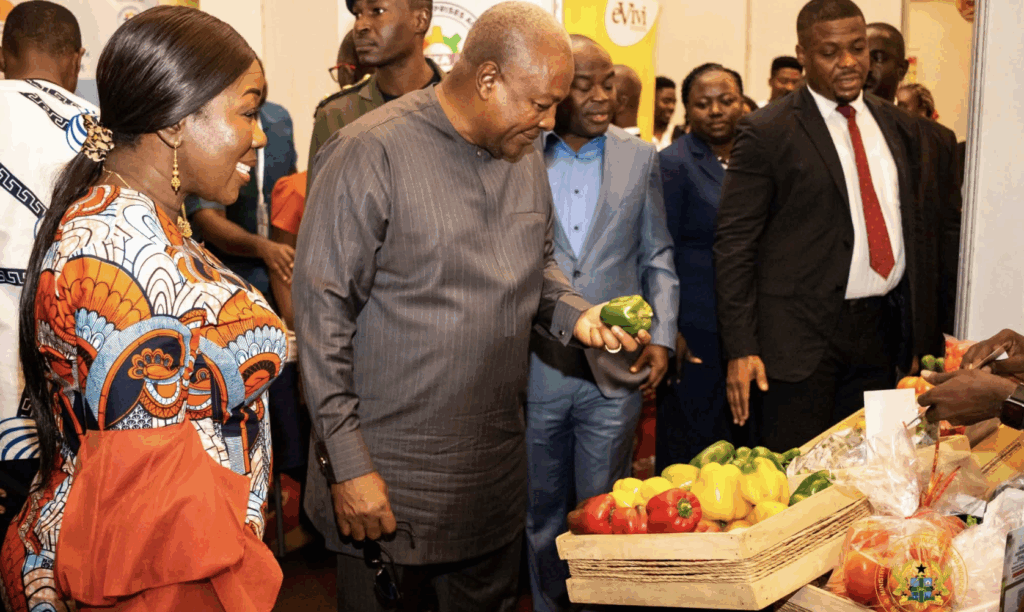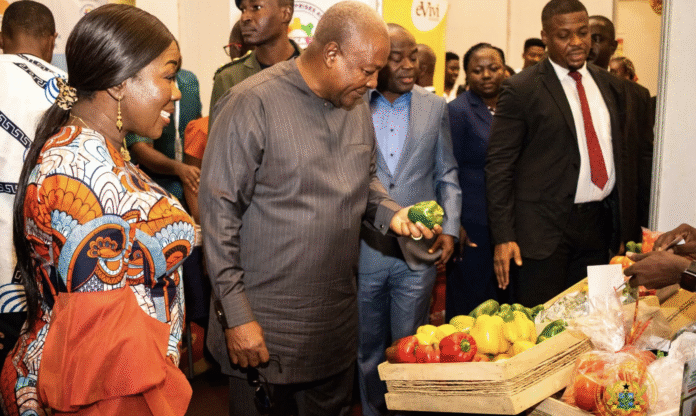
President John Dramani Mahama has announced the development of a comprehensive National Agribusiness Policy aimed at providing strategic direction, boosting investment, and enhancing coordination across Ghana’s agribusiness ecosystem.
Delivering the keynote address at the opening of the maiden National Agribusiness Dialogue in Accra, President Mahama said the new policy will focus on value addition, global competitiveness, processing standards, and building resilient supply chains to anchor Ghana’s industrial transformation.
The Dialogue, themed “Resetting Agribusiness for Inclusive and Sustainable Industrial Growth,” seeks to craft a homegrown, inclusive policy tailored to the realities and aspirations of Ghanaians. It brings together stakeholders across government, industry, and agriculture to reimagine agribusiness as a key pillar of national development.
“This Dialogue is not just another meeting. It is a call to action. We must move from talking to implementation,” President Mahama stated. “The time has come to unlock the full potential of agribusiness as the new driver of Ghana’s inclusive and sustainable industrial growth.”
President Mahama lauded the Ministry of Trade, Agribusiness and Industry for championing a bold realignment that places agribusiness at the heart of Ghana’s trade and industrial policy. He stressed that this is a deliberate strategy to transition Ghana from an agrarian economy into a competitive, export-led industrial hub.
Repositioning Agribusiness for Growth
Describing agribusiness as the “cornerstone of Ghana’s economic transformation,” President Mahama called for urgent action to reposition the sector to deliver jobs, diversify exports, and strengthen food security.
He underscored the need to develop infrastructure and food production corridors, especially in the northeastern parts of the country, to ensure seamless movement of produce and enhance market access.
With global agribusiness markets projected to expand significantly, President Mahama noted that Ghana, with its vast arable land, rich water resources, and a youthful population, is well-positioned to become a major player in global food systems. He emphasised the importance of value addition, integration into global value chains, and building robust local supply systems to fully seize this opportunity.
24-Hour Economy and Policy Initiatives
To support agribusiness growth, the President outlined a range of initiatives tied to his 24-hour economy agenda, including:
The Keep the Industries Initiative
The Rapid Industrialisation Initiative
The Accelerated Export Development Programme
He said these programmes depend on the consistent supply of raw materials and will require a shift from single-season farming to year-round agriculture, supported by expanded irrigation and modern mechanisation.
As part of this push, President Mahama introduced the Feed Industry Programme, built on four strategic pillars:
Commercial Farmer Development
Post-Harvest Loss Solution Centres
Industrial and Market Development
Institutional Capacity Building
He expressed confidence that these measures would raise Ghana’s industrial capacity utilisation from the current 30–40% to between 70% and 80%.
To support local content, the government is compiling a comprehensive list of agro-processed products manufactured in Ghana to guide procurement and encourage consumption of locally made goods.
Ministry of Trade Champions Policy Shift
Minister for Trade, Agribusiness and Industry, Mrs Elizabeth Ofosu-Adjare, commended President Mahama for his vision and leadership. She described the President’s presence at the event as a strong reaffirmation of his commitment to agribusiness as a vehicle for national development, industrialisation, job creation, and food security.
Mrs Ofosu-Adjare noted that the Ministry’s expanded mandate to include agribusiness reflects a paradigm shift in how the sector is approached and underscores the need for a clear, inclusive, and forward-looking policy.
“The theme for this Dialogue is both timely and intentional,” she said. “We aim to empower every actor in the agribusiness value chain, including women, smallholders, and SMEs, while promoting sustainability and environmental stewardship.”
She reiterated the need for Ghana’s agribusiness sector to move beyond its traditional limitations and embrace a bold, transformative agenda that reflects the country’s industrial and economic ambitions.
The National Agribusiness Dialogue marks what many see as a pivotal turning point in Ghana’s development agenda—one that places agribusiness at the forefront of economic growth, job creation, and sustainable prosperity.
DISCLAIMER: The Views, Comments, Opinions, Contributions and Statements made by Readers and Contributors on this platform do not necessarily represent the views or policy of Multimedia Group Limited.
DISCLAIMER: The Views, Comments, Opinions, Contributions and Statements made by Readers and Contributors on this platform do not necessarily represent the views or policy of Multimedia Group Limited.


